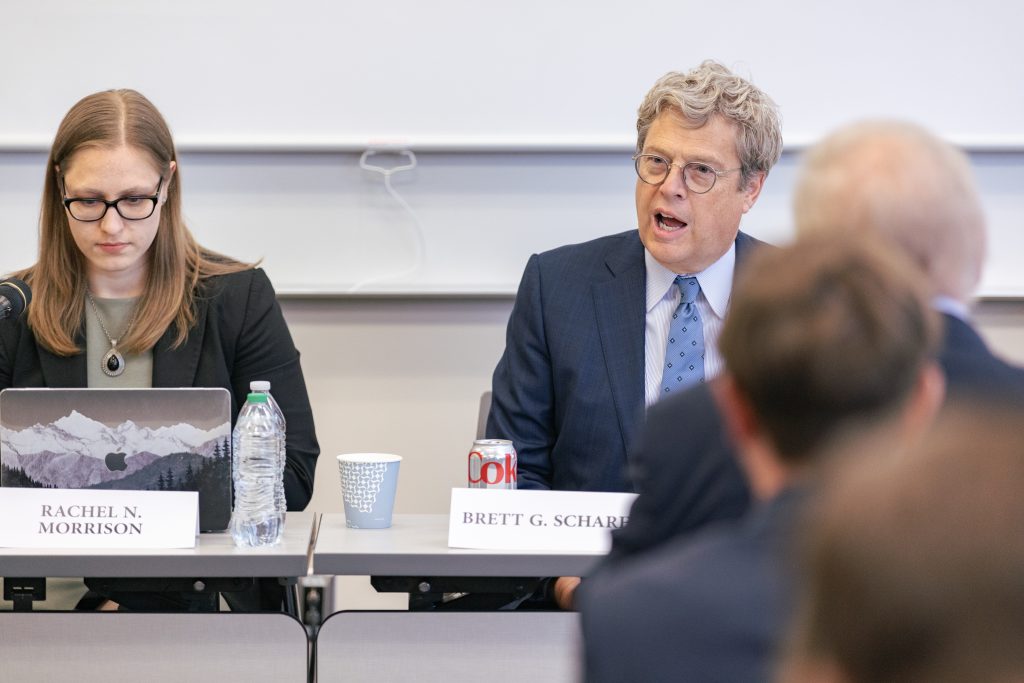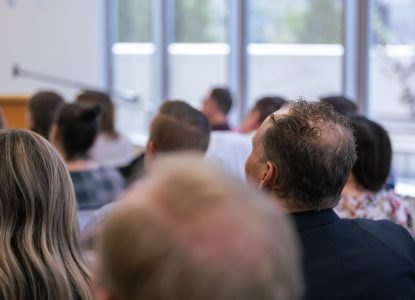By Marianna Richardson, Director of Communications for the G20 Interfaith Forum
– – –
One June 17, 2025, G20 Interfaith Forum members Marianna Richardson, Director of Communications; Timothy Stratford, General Counsel; and Mark and Barb Taylor, Senior Fellows, attended the International Center for Law and Religion Studies (ICLRS) 2025 Annual Religious Freedom Annual Review with the theme of “Religion, Peace, and Human Flourishing: Understanding the Whys of Religious Freedom.” This review is a compilation based on notes taken by Marianna Richardson.
Becoming a Peacemaker and Encouraging Human Flourishing
To start the Review, Prof. Brett G. Scharffs, Director of ICLRS, focused on the importance of dealing with the deep divisions caused by antisemitism, fear, and recent domestic violence in Utah and the United States. He reflected on what does not heal divisions: sarcasm, aggression, vilification, or blame. Instead, Scharffs highlighted the two guiding principles that were the two major themes of the Review: (1) Pres. Russell M. Nelson’s prophetic call to be peacemakers and (2) the pursuit of human flourishing for all people. Drawing from the Church of Jesus Christ of Latter-day Saint teachings, covenant communities are built on both vertical covenants with God and horizontal commitments to one another. Unprecedented LDS temple growth serves as a symbol of the expansive, sacred effort of the growth of covenant communities. True covenantal living demands love—a love that, as described in 1 Corinthians 13:4–5, is patient, kind, and persistently difficult. Yet love remains the most effective path forward. It works. And it takes work.

Covenant-Centered Flourishing in a Christ-Focused Education
BYU as a Christ-centered Institution
Pres. Shane C. Reese, the provost of Brigham Young University, emphasized Brigham Young University’s identity as a Christ-centered institution where academic rigor is harmonized with spiritual development. BYU students are encouraged to pursue bilingual fluency—both in the language of disciplinary excellence and the language of faith. Reinforcing these dual commitments helps protect the university’s religious mission and ensures success not just in learning, but in living with purpose.
Contracts versus Covenants
Drawing from Rabbi Jonathan Sacks words, Reese contrasted contracts—transactional, self-focused agreements—with covenants, which are sacred, enduring commitments formed between individuals of integrity who share mutual responsibility. Covenants are the foundation of true community and peacemaking, requiring us to set aside personal interests for the greater good. They shift the focus from “I” to “we.”
The Value of Religiosity
Research supports the value of this covenantal, faith-anchored approach to flourishing. The three pillars identified are (1) the centrality of family, (2) the constitutional protection of religious freedom (especially vital for young people to understand), and (3) religion’s proven ability to strengthen society. Faith-based communities statistically report lower levels of depression and loneliness, according to scholars like Ryan Burge and studies by Pew Research. Religious affiliation offers individuals a deeper sense of meaning, connection, and long-term well-being. Flourishing, in this model, is not accidental; it’s cultivated through covenants, community, and Christ.
Covenants, Liberty, and the Path to Flourishing
The Sacred Link Between Covenants and Human Flourishing
Elder Marcus B. Nash, a Member of the Presidency of the Seventy, pointed out that Latter-day Saint scripture teaches that in the latter days, people will flourish as they live in covenant with God and each other. The free exercise of religion is not just a constitutional right; it is a divine mandate that allows these sacred relationships to grow.
A Legacy of Religious Perseverance
One powerful example is the story of the Elder Nash’s third great-grandfather, a Latter-day Saint convert who was imprisoned in Norway in 1852 for preaching his faith. Despite facing government repression and incarceration, he sang hymns in jail, embodying both courage and devotion. His experience testifies to the price of religious freedom, and the miracle it represents today.
The U.S. Constitution and Divine Influence
The U.S. Constitution was forged by principled yet differing minds and was a near-miraculous achievement. Founding figures like Benjamin Franklin acknowledged divine guidance in their deliberations, affirming the belief that “God governs in the affairs of men.” This heavenly influence shaped a society where religion could thrive without one religious tradition overpowering another.
Religion and Civic Flourishing
President Dallin H. Oaks reaffirmed in April 2021 that true liberty relies on moral agency and religious conviction. The Constitution’s power depends on the virtue of the people it governs. Flourishing in a democratic republic means working together across religious and ideological lines, not erasing differences but elevating shared values.
Unity Through Righteous Pluralism
Prof. Lawrence Edwards Carter, Sr shared his vision for unity without uniformity. Differing beliefs need not be demonized; instead, they can become steppingstones toward common ground. The First Amendment’s protection of religious freedom ensures this pluralism remains a strength, not a threat. As John Adams and George Washington taught, liberty cannot survive without national morality—and morality is inseparable from faith.

Flourishing in Fullness: Faith, Relationships, and a Life Well-Lived
Empirical Research and the Global Flourishing Study
Professors Matthew T. Lee, Baylor University, and Harold Koenig, Duke University, both talked about the Global Flourishing Study, which is one of the most ambitious empirical efforts to understand and measure human well-being across the globe. It recognizes flourishing as more than subjective well-being; it is a rich, integrated state of life marked by meaning, connection, and completeness. This work draws from extensive survey research and offers valuable tools and insights for applying these findings in leadership, education, policy, and personal development. The project promotes a vision of complete well-being that is sustainable, relational, and spiritually grounded.
The Relational Core of Flourishing
At the heart of flourishing lies a profound relational truth: we are shaped and sustained by the love others give us. Prof. Lee had attendees experience a reflective exercise to encourage them to consider the people who have “loved them into being” to recognize how love has energized and grounded their lives. This isn’t sentimental but essential wisdom. Flourishing requires connection and dialogue which acknowledges the transformative power of love, compassion, and mutual care.
Beyond Strengths: Embracing Plenitude and Brokenness
Flourishing also requires confronting paradox. Our greatest strengths can become our vulnerabilities. Life is often tinged with grief and adversity, and yet, true flourishing is about embracing “plenitude”—a wholeness that includes imperfection. The field of social science on flourishing is still emerging, but it seeks to integrate various dimensions—emotional, physical, social, planetary, and spiritual—into one cohesive vision of the good and deep life. We never fully “arrive,” but we grow in the art of harmonizing our domains of life and reconnecting in meaningful ways.
Six Dimensions of Sustainable Flourishing
Through a “Secure Flourishing Index,” researchers identify six core domains of a flourishing life: happiness and life satisfaction, mental and physical health, meaning and purpose, character and virtue, close social relationships, and financial and material stability. Importantly, flourishing is not the absence of hardship, but the sustainable integration of diverse and interconnected aspects of life at personal, communal, institutional, and even ecological levels.
Faith, Society, and the Spiritual Framework
Religion emerges as a powerful contributor to flourishing, not simply as a private belief system but as a public good. Attendance at religious services, particularly during formative years like age 12, has been shown to be a strong predictor of later flourishing. Scholars like Miroslav Volf distinguish between “thick” religion, which places desires within a larger moral and spiritual framework, and “thin” religion, which becomes politicized and loses its ethical vision. True religious engagement fosters compassion, humility, and a recognition of the equal worth of every person.
Flourishing as a Sacred Responsibility
Ultimately, flourishing is not an individual achievement but a collective calling. It invites us to examine where people feel alienated from themselves, from others, from nature, and from the Sacred and to co-create spaces of connection and vitality. St. Thomas Aquinas defined love as “to will the good of the other,” and this love when embedded in our institutions, relationships, and communities becomes the sustaining force of a life well-lived. Even in a world of material affluence and “competitive insanity,” the call to harmony, love, meaning, and mutual flourishing remains as urgent as ever.
Faith, Community, and the Path to Flourishing
Resilience Rooted in Faith
Rev. Dr. David G. Latimore reflected on the sacred privilege of standing with others in their darkest moments during grief, disaster, and loss. He emphasized the seemingly irrational yet powerful ability to celebrate after tragedy, which is made possible by drawing on a strength greater than ourselves. In African American religious tradition, such strength has long come from communal worship, theological imagination, and gathering, often in secret, to envision a better world and affirm shared dignity. Faith communities not only supported survival during Reconstruction and the Civil Rights Era, but also built schools, co-ops, and clinics, enabling a flourishing grounded in faith and material wellbeing.
Flourishing Beyond Rhetoric
True religious liberty, Latimore asserted, cannot be merely rhetorical; it must be embodied in the lives of everyday people. The faith that speaks to heart, hands, and feet calls for action against systemic injustice, from environmental harm to economic disparity. Christianity compels unity, bold speech, and the pursuit of peace—not as abstraction, but as living practice.
From “I” to “We”
Shaylyn R Garrett’s research on American flourishing (discussed in her book Upswing) tracks a historic swing from individualism to community and back again. While prosperity has grown, so have inequality and division. She contends that culture, not economics, is the leading variable. Reclaiming a “we” society requires a renewal of faith-based service, neighborly connection, and shared responsibility.

Civility, Compromise, and the Path to Common Ground
The Utah Compromise as a Model of Balance
Tim Schultz, president of the First Amendment Partnership, discussed the legal shifts surrounding religious freedom and LGBTQ rights—from RFRA to Obergefell—and how they have intensified national polarization. As tensions rose, civility often diminished. In response, the 2015 Utah Compromise emerged as a practical and principled approach, offering legal protections for both LGBTQ individuals and religious institutions in housing and employment. Backed by both The Church of Jesus Christ of Latter-day Saints and Equality Utah, it demonstrated how mutual respect and compromise can address competing rights without undermining either side.
President Oaks’ Framework for Civil Dialogue
In a 2021 address at the University of Virginia, President Dallin H. Oaks outlined four guiding principles for civil discourse: mutual respect, self-restraint, shared constitutional understanding, and good faith negotiation. This vision rejects “winner-take-all” tactics in favor of recognizing the dignity of all and forging enduring relationships through principled dialogue or an “American covenant” rooted in both law and moral trust.
Voices of Courage and Coalition-Building
Tyler Deaton, senior advisor at the American Unity Fund, emphasized the difficult but essential work of coalition-building in a pluralistic democracy. True peacemaking requires courage and the ability to take criticism, to speak truthfully, and to embrace complex identities. The Fairness for All approach seeks not to erase disagreements but to ground them in shared values and the common good.
The Role of Faith in Healing Division
Faith leaders from diverse traditions underscored that complicity isn’t the only moral lens—dialogue, humility, and collective action also matter. From immigration to LGBTQ rights, issues that once divided are now shared concerns. A responsible faith coalition, working across lines of difference, can step away from extremes and foster civility, unity, and flourishing in an increasingly fractured society.
Peacemaking, Dignity, and the Transformative Power of Faith
Faith in Action: From War Zones to Neighborhoods
G. S. Mack McCarter III, founder of Community Renewal International, emphasized the lifelong human struggle between self-centeredness and the yearning for deep connection. Learning from his work in one of Washington, D.C.’s most dangerous neighborhoods, he asserted that the love of God can heal fractured communities. Comparing this to the organizational success of ant colonies, McCarter called for a global neighborhood unified by love, a vision where people actively choose to love and work with others to lift humanity.
Habits of Peacemakers: Intellectual Humility and Principled Conviction
Prof. Steven T. Collis, professor of law at UT-Austin, highlighted the importance of religious freedom as a pillar of civil society, while warning against two major barriers to peacemaking: a lack of intellectual humility and toxic team loyalty. Embracing what we don’t know fosters deeper dialogue. True leadership means standing for principle even when it challenges group loyalty exemplified by groups like ADF and ACLU finding common ground.
Dignity as the Foundation of Peace
Tami Pyfer, co-creator of the Dignity Index, argued that contempt is destroying our civic fabric, while dignity can mend it. Referring to the work of scholars like Donna Hicks and religious leaders like Elder Gary E. Stevenson, she defined dignity as the mutual recognition of the desire to be heard, seen, and valued. A society rooted in dignity moves away from “us vs. them” mentalities and toward shared values and aspirations.
Abraham Lincoln: A Model of Lasting Statesmanship
Historian Talmage Boston pointed to Abraham Lincoln as a paragon of dignity, humility, and kindness. With traits like magnanimity and equanimity, Lincoln embodied moral clarity, even in the darkest days of the Civil War. His refusal to hate or humiliate even his adversaries illustrates how his leadership fostered national healing. The phrase, “with malice toward none, with charity for all,” were not just words to him, but he lived it.
Conclusion: The Relevance and Reach of Religious Freedom
Elizabeth Clark, associate director of ICLRS, concluded the conference by reminding attendees why religious freedom matters for both people of faith and people of no faith. In testimonies from Eastern Europe and Central Asia, where generations worshiped in secret or were imprisoned for their beliefs, we’re reminded that religious liberty is more than a privilege; it is a foundation of dignity, healing, and community. From hymn-singing in dark basements to building bridges with neighbors, faith continues to shape a flourishing society.
– – –
Marianna Richardson is the Director of Communications for the G20 Interfaith Forum. She is also an adjunct professor at the Marriott School of Business at Brigham Young University.


